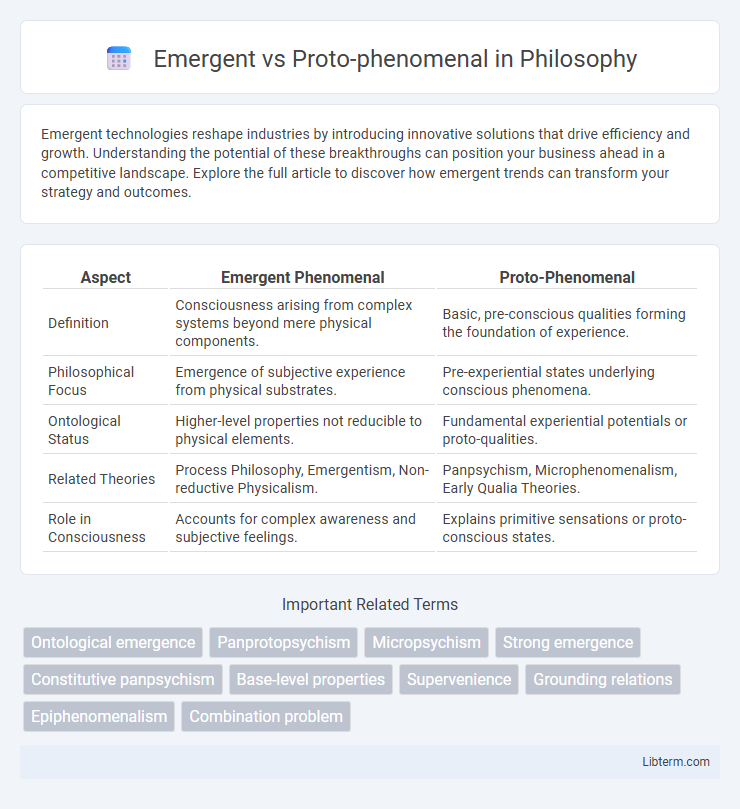Emergent technologies reshape industries by introducing innovative solutions that drive efficiency and growth. Understanding the potential of these breakthroughs can position your business ahead in a competitive landscape. Explore the full article to discover how emergent trends can transform your strategy and outcomes.
Table of Comparison
| Aspect | Emergent Phenomenal | Proto-Phenomenal |
|---|---|---|
| Definition | Consciousness arising from complex systems beyond mere physical components. | Basic, pre-conscious qualities forming the foundation of experience. |
| Philosophical Focus | Emergence of subjective experience from physical substrates. | Pre-experiential states underlying conscious phenomena. |
| Ontological Status | Higher-level properties not reducible to physical elements. | Fundamental experiential potentials or proto-qualities. |
| Related Theories | Process Philosophy, Emergentism, Non-reductive Physicalism. | Panpsychism, Microphenomenalism, Early Qualia Theories. |
| Role in Consciousness | Accounts for complex awareness and subjective feelings. | Explains primitive sensations or proto-conscious states. |
Defining Emergent Phenomenal Consciousness
Emergent phenomenal consciousness refers to the complex subjective experience that arises from the brain's integrated neural processes, distinguishing itself from proto-phenomenal states that represent more basic, pre-conscious sensory inputs. It is defined by the synthesis of sensory data, cognitive functions, and self-awareness, resulting in a rich, unified experience of awareness. Neuroscientific studies highlight the role of cortical and thalamic networks in producing emergent phenomenal consciousness, emphasizing its dependence on higher-order neural interactions rather than isolated sensory activation.
Understanding Proto-phenomenal Properties
Proto-phenomenal properties refer to the basic, pre-conscious building blocks believed to underlie phenomenal experience, characterized by intrinsic qualities that do not yet constitute full consciousness. Understanding these properties helps bridge the gap between physical processes and emergent phenomenal states, highlighting how fundamental aspects of reality might give rise to subjective experiences. Research into proto-phenomenal properties investigates their role in the emergence of awareness, emphasizing their potential as foundational units in theories of consciousness such as panpsychism and integrated information theory.
Historical Context: Emergent vs Proto-phenomenal Theories
Emergent theories of consciousness gained prominence in the late 20th century, emphasizing complex systems where novel properties arise from neural interactions without reducing to their parts. Proto-phenomenal theories, rooted in early 20th-century philosophy and neuroscience, propose that basic experiential qualities exist at a fundamental, pre-conscious level within neural substrates. Historical debate centers on whether consciousness emerges solely from complex processes or if proto-phenomenal properties are inherent at simpler, elemental neurobiological levels.
Core Differences Between Emergent and Proto-phenomenal Views
Emergent views posit that consciousness arises from complex neural interactions, suggesting it is a higher-order property not reducible to physical components. Proto-phenomenal perspectives argue that fundamental properties or proto-conscious aspects exist at a basic physical level, serving as building blocks for full consciousness. The core difference lies in emergent theories emphasizing consciousness as a novel feature of complexity, while proto-phenomenal theories propose inherent experiential qualities embedded in the fabric of reality.
Philosophical Arguments for Emergent Phenomenalism
Emergent phenomenalism posits that conscious experiences arise from complex neural interactions, emphasizing that subjective qualities cannot be fully explained by physical components alone. Philosophical arguments for emergent phenomenalism highlight the inadequacy of reductionist physicalism in accounting for qualia, supporting the view that new properties emerge at higher levels of brain organization. This perspective aligns with non-reductive physicalism and challenges proto-phenomenal theories by asserting that phenomenal consciousness is a novel, irreducible phenomenon contingent on emergent processes.
Proto-phenomenalism: Key Concepts and Criticisms
Proto-phenomenalism posits that consciousness arises from fundamental non-conscious proto-phenomenal properties, which serve as the building blocks for subjective experience in emergent systems. Key concepts include the intrinsic nature of these proto-phenomenal properties and their arrangement within neural structures, leading to emergent consciousness without invoking dualism. Criticisms often target the speculative nature of proto-phenomenal properties, the lack of empirical evidence, and the challenge of explaining how these micro-level properties synthesize into unified conscious experience.
Ontological Implications of Emergence and Proto-phenomenality
Emergent phenomena arise from complex systems where novel properties manifest that are not reducible to their individual components, suggesting a layered ontological reality with higher-level entities having causal powers. Proto-phenomenality implies foundational experiential qualities embedded in fundamental physical processes, challenging strict physicalist ontologies by positing primitive experiential aspects at the base of reality. The ontological implications of emergence emphasize the coexistence of multiple levels of reality, while proto-phenomenality calls for a revision of metaphysical frameworks to integrate consciousness as a fundamental constituent rather than a derivative property.
Impact on Consciousness Studies and Philosophy of Mind
Emergent phenomena in consciousness studies highlight complex mental states arising from neural networks, emphasizing systemic interactions beyond individual components. Proto-phenomenal properties propose fundamental experiential qualities rooted in basic physical processes, suggesting a panpsychist framework that challenges traditional dualism. This distinction shapes philosophical debates on the nature of mind, influencing theories on whether consciousness is a product of emergent complexity or an intrinsic feature of the physical world.
Empirical Approaches: Testing Emergent vs Proto-phenomenal Claims
Empirical approaches to testing emergent versus proto-phenomenal claims involve rigorous experimental designs that measure consciousness indicators such as neural correlates, behavioral responses, and subjective reports. Neuroimaging techniques like fMRI and EEG provide data to differentiate between emergent phenomena, where consciousness arises from complex neural interactions, and proto-phenomenal states, which suggest simpler, foundational experiential elements. Quantitative analysis of these datasets enables scientists to evaluate the validity of each claim by assessing consciousness levels across varying degrees of neural complexity.
Future Directions for Research and Debate
Emergent and proto-phenomenal theories of consciousness invite future research to refine their explanatory frameworks through advanced neuroimaging and computational modeling, aiming to distinguish complex emergent properties from foundational proto-experiential states. Investigating the neural correlates associated with each framework can clarify how subjective experience arises and evolves, offering critical insights into the boundaries between non-conscious processing and minimal phenomenal awareness. Empirical studies integrating interdisciplinary approaches in cognitive science, philosophy, and artificial intelligence will further illuminate the mechanistic and phenomenological differences, enhancing the ongoing debate on the nature of consciousness.
Emergent Infographic

 libterm.com
libterm.com